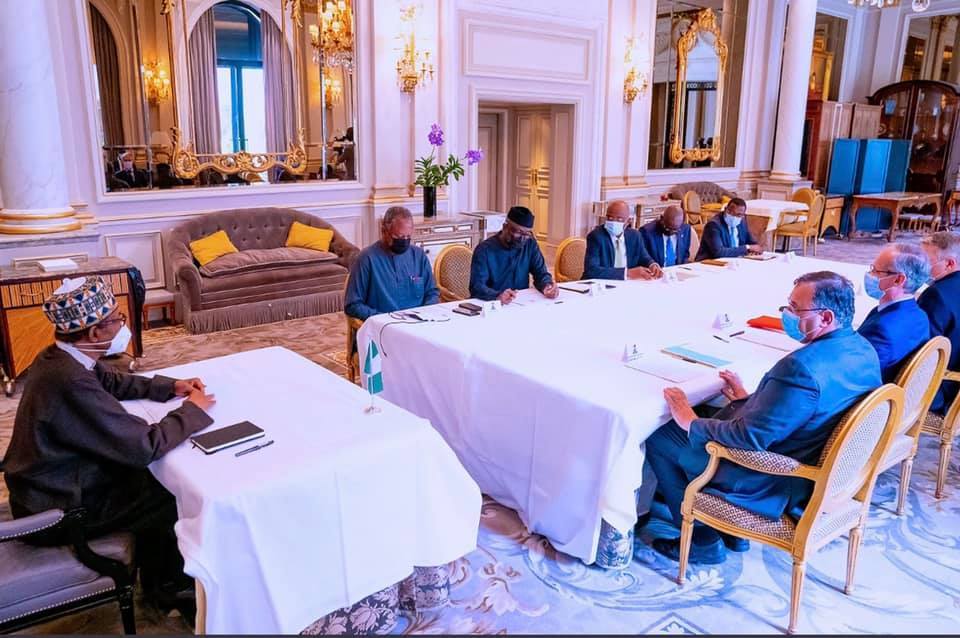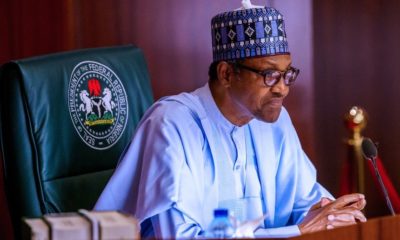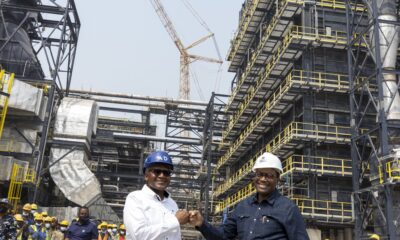President Muhammadu Buhari on Wednesday in Paris, France, assured investors that Nigeria’s fiscal policies would be more favourable, predictable and measurably tilted towards creating a harmonious business environment.
Malam Garba Shehu, the president’s spokesman in a statement in Abuja on Wednesday, said Buhari gave the assurance at meetings with Chairman/CEO of Total, Patrick Pouyanne and Executive Vice President, AirBus, Silvere Delaunay
The president also met with the Chairman of the Board of a software company Dassault Systèmes, Florence Verzelen, Chairman/CEO of General Engineering and Marketing of Telecommunications Operator, Francois-Regis Teze and Chairman/CEO, Donaflex Automotive, Dr Donatus Nwokoye, a very successful manufacturer.
The Nigerian leader urged the investors to further explore vast opportunities for human and natural resources in Nigeria.
At the meeting with the delegation from Total, Buhari said the outlook and potentials for growth in the country had remained steadily positive.
He affirmed the government’s commitment to scale up operating standards and policies that encourage mutual benefits.
“We are very pleased with the evolving trends in technology, which is currently driving development across the world and Nigeria. Nigeria is more a gas country than a crude oil-producing country. In the 80’s we generated more from gas, than crude oil.
“In the ’80s, we were earning more from gas for some years and had put in place structures. We intend to further explore the gas sector. I am pleased with your consistency in staying in Nigeria,’’ he said.
The president said investors should take advantage of the natural and human resources, pointing out that the demographics favour development, with more young people who are eager to be gainfully engaged and trained.
“We need to educate the youth and encourage more skills in technology. Technology has been most impactful in all sectors, including the oil and gas, which has witnessed a rapid transformation in exploration, processing and distribution,’’ he added.
The president thanked the Chief Executive Officer of Total for the company’s consistency and expansion in Nigeria since 1956, assuring that the government would enhance fiscal stability that will favour investors.
Group Managing Director of the Nigerian National Petroleum Corporation (NNPC), Mele Kyari, said Total had confirmed long term investments in Nigeria and had consistently exceeded targets in gas production.
He said the NNPC had already designed solutions to some of the challenges in the oil and gas sector, particularly on tax.
In his remarks, Pouyanne told the president of the readiness of the company to stay in Nigeria and further expand interest in oil, gas, solar and other commodities that will directly impact the lives of citizens.
The Chief Executive of Total said investors had been eagerly waiting for the passing of the Petroleum Industry Bill (PIB) as it will send a strong signal of more predictability.
“Total is very committed to Nigeria. We have no intention of leaving Nigeria,’’ he said.
The presidential aide further revealed that President Buhari received in audience the President of Ethiopia, Sahle-Work Zewde who came to brief him on the regional security and political situation in the Horn of Africa.

 Naira4 weeks ago
Naira4 weeks ago


 Naira4 weeks ago
Naira4 weeks ago


 Naira3 weeks ago
Naira3 weeks ago


 News4 weeks ago
News4 weeks ago
 Travel4 weeks ago
Travel4 weeks ago




 Naira3 weeks ago
Naira3 weeks ago


 Jobs3 weeks ago
Jobs3 weeks ago
 Naira3 weeks ago
Naira3 weeks ago




















